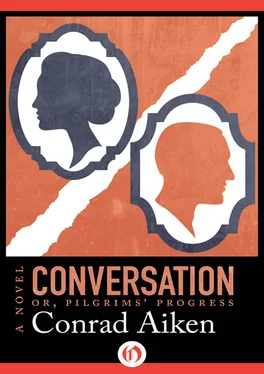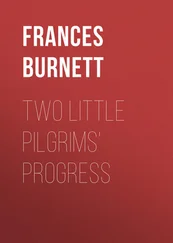When what?
He averted his eyes from the thought, from the memory of the walk with Buzzer, in which the sun-bright fog and the queer dream and the letter had all been so deliciously and magically woven together. It was as if he had winced; and instead he turned the cold water tap quickly on and off several times, in the kitchen sink, to watch the indicator in the dial drop down and then shoot up again. Twenty-eight. He could go out and start the engine, of course, and run it for five minutes, just to test it — but actually there was water enough for two days. And besides, there was the “tempest,” Ratio’s tempest, it was raining. Tempest! These absurd Cape Codders! Like calling the ceiling the “wall,” and the walls “side-walls.”
He turned down the little fishtail of yellow flame in the reflector lamp on its shelf behind the stove, walked slowly into the dining room, and blew out the candle on the piano; then proceeded, slowly again, his hands in his pockets, to the studio. It was exactly as he had foreseen. Enid was standing — simply standing —in the middle of the room, behind her wicker chair. Her fists were on her hips, and she was facing, but not looking at, the fire — the narrowed eyes were looking downward at nothing. For a second they lifted to meet his — a curious and remote look, as if it came from far beneath, far below, quickly and blindly tipped upward and then tipped down again. There was something doll-like in the movement, something inhuman and mechanical, but also pathetic. Then, addressing the fire, she said slowly:
“Well, what are we going to do?”
“That’s up to you!”
“Why is it up to me?”
“You started the whole thing, it’s all your creation, your action, your aggression— I haven’t done anything—”
“You persist in that, don’t you?”
“Certainly.”
“I wish you could see that my aggression, as you call it—”
“Oh, call it anything you like!”
“Will you let me finish? — is simply a symptom. Of the deeper grievances that I’ve tried to tell you about, and that you won’t face. When I try to talk to you about them, you merely take to abuse and swearing.”
“What nonsense!”
“It’s true. As just now when I presumed to suggest that a little of your imaginative sympathy with Buzzer might well come to me — and all you could do was accuse me of jealousy.”
“And wasn’t it?”
“No!”
“Oh. I beg your pardon.”
“And besides, what you were really doing, was evading the point. Exactly as you always do. You didn’t want to face the fact that you don’t any longer give me that kind of imaginative sympathy. Do you.”
“I wasn’t aware of it. Perhaps I don’t. But if I don’t, is it any wonder? You don’t make yourself very attractive when you do this sort of thing, you know — you can’t drive me with a whip and then expect me to come to you with imaginative sympathy! Good god, I never heard anything so idiotic. Yes, and let me tell you another thing, while we’re on the subject — one that I wouldn’t have supposed a woman would ever have to be told by a man, either — and that is this: the one thing you cannot do in a marriage is demand love, or understanding, or sympathy, or whatever you want to call it, at the point of a pistol. You cannot do that. It’s fatal. There is nothing so calculated to freeze every spark of feeling — the mere demanding of it kills it. Feelings can’t be probed and bullied like that, you’ve got to leave them alone. And it’s bad enough, by god, to have you make the mistake — without my then having to explain it to you! Where does that leave me? A hell of a long way off, I’m afraid.”
“You’re very clever, aren’t you?”
“There’s nothing clever about it — it’s the unfortunate truth.”
“I see. So if I’m unhappy, of course it’s a mistake to say so. I mustn’t complain, on the penalty of making things still worse by alienating you. It’s a very ingenious little system, isn’t it? Oh, very. I’m just supposed to eat my heart out in silence. And if I hate this life here and hate all these people and hate being alone so much and hate the work and the dirt and the dishes and the everlasting social drabness and boredom of it, not to mention only seeing you half the week, and even then being pushed off by you because you want to work—”
“Go on!”
“I will go on. If I hate all this until I’m sick, and feel wretched day in and day out of the days on end when I’m alone, worrying about the money and how to make ends meet, or to keep up appearances, I’m just expected by you to say nothing. Why? Why? What do I get out of it? Oh, I know, all that nonsense of yours about plain living and high thinking, about living the natural and honest life of our Pilgrim ancestors, and being independent — but it’s no good for a woman, I can’t stand it much longer, I’m being starved, I warn you, Timothy.”
“I see. So it’s like that. You won’t stick to your bargain.”
“There was no bargain.”
“There was an agreement.”
“An agreement to try it, yes!”
“And certainly for a longer period than this. Long enough for me to see how my own work would go, to see what I could do.”
“But what have you done? Nothing.”
“Nothing! That’s what you always say, isn’t it? The truth is, and for me it’s a damned bitter truth, that you never even bother to look at my work, you don’t take any longer the slightest interest in it, except insofar as it might make some money, you don’t know what I’m doing. Things have changed a lot in five years, haven’t they? By god, yes. It makes me laugh. I can remember when you used to ask to see what I was doing, in the first year or two — and when we were engaged you could think of nothing else. But nowadays all I get from you is the old parrot cry of why not do portraits, why not do portraits—”
“Well, I’m sorry—”
“ Sorry ! Good god almighty.”
“Besides, if you’re not altogether sure of yourself, how can you expect me to be sure of you?”
“You were sure enough when we were engaged, weren’t you?”
“Yes, yes — I was. But don’t forget that we were both very young.”
“Of course! And now we’re grown up, aren’t we? And must put away these childish things — is that it? I suppose you think my career is finished? I suppose you think I ought to give it up entirely, and do nothing but teach — is that it? Come on, let’s hear you say it!”
“Will you please stop twisting my words? I merely meant that it was natural enough, when we were both young, that we should feel confident.”
“Ah. And natural enough now that we should be disillusioned. You are disillusioned, aren’t you?”
“No — but disappointed! It hasn’t seemed to me—”
“Yes, go on, let’s have it.”
“—that your work has matured much. It seems to me to be still young and unformed.”
“Oh, yes, I know — adolescent. Why not stick to your favorite word!”
“In a way, yes.”
“Gosh, what a comfort that is! Unformed and adolescent — which I suppose by implication applies to me too. After eight years of work and sweat and passion — by god, it’s too funny. It’s funny either way — funny as the devil if you’re right, funny as hell if you’re wrong. And if Karl sees power in it, well, then, Karl is adolescent too. We’re all adolescent, the whole lot of us — which is just what you’ve really been maintaining all along — as, of course, so conspicuously in the Jim Connor episode!”
Читать дальше












